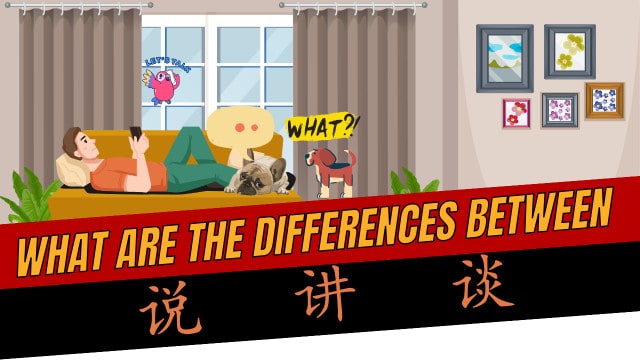In this post, we are going to talk about the three most commonly used verbs 讲 (jiǎng), 说 (shuō), and 谈 (tán). These three verbs have the meaning of to speak, to chat in English. Although they are similar in meaning, they also possess distinct differences in their usages. So, what are the similarities and difference between 说shuo 讲jiang 谈tan ?
The Chinese word “讲” (jiǎng) is similar to 说 (shuō) to mean to speak, to tell or to say. It has multiple meanings depending on the context that it is used. The difference between 说 and 讲 depends on the word combination used. In some combinations, 说 and 讲 are interchangeable, and in some they are not.

How to use 讲 and 说
1. To Speak / Talk:
When using 讲 to mean speak or talk, such as 讲话” (jiǎng huà), you can change 讲 to 说 = 说话 ((shuō huà).
彼得在和玛丽讲话。Bǐdé zài hé Mǎlì jiǎng huà.
Peter is talking to Mary.
you can change 讲话 to 说话
彼得在和玛丽说话。”Bǐdé zài hé Mǎlì shuō huà.
Peter is talking to Mary
你讲(说)的话太感人了。Nǐ jiǎng(shuō)de huà tài gǎn rén le.
What you said is very touching.
2. To explain
When expressing the idea of explaining using 讲, the Chinese phrase is 讲解 which means to provide an explanation or interpretation. 解(jiě) means to solve to untie. Although 说解 is a Chinese phrase found in the “The History of Confucian Studies”, it is not commonly used.
这件事是怎么发生的,你快跟我讲清楚 / 说清楚。
Zhè jiàn shì shì zěnme fāshēng de, nǐ kuài gēn wǒ jiǎng qīng chǔ / shuō qīng chǔ.”
How did this happen? Explain it to me quickly.
他讲了半天也讲不明白。/ 他说了半天也说不明白。
Tā jiǎng le bàn tiān yě jiǎng bù míng bái. / Tā shuō le bàn tiān yě shuō bù míng bái.
He talked for a long time but still couldn’t explain it clearly.
3. To give a lecture or speech
大卫每年都会到东京大学讲学。
Dà wèi měi nián dōu huì dào Dōng jīng Dà xué jiǎng xué.
David lectures at the University of Tokyo every year.
*For this sentence, it is incorrect to change 讲学 to 说学.
老师的课讲得很深奥,很多学生都听不懂。
Lǎoshī de kè jiǎng dé hěn shēn’ào, hěn duō xué shēng dōu tīng bù dǒng.
The teacher’s lecture is very (profound) difficult; many students are not able to understand.
*you cannot change 讲 to 说 because of 课. You cannot change 讲课 to 说课. However, if the sentence is 老师讲得很深奥, then it is ok to change to 老师说得很深奥.
4. To criticize or blame someone
彼得知道错了,你就不要在说他了。
Bǐdé zhīdào cuòle, nǐ jiù bùyào zài shuō tāle.
Peter knows he has done wrong, so you don’t need to blame / scold him anymore.
*as 讲 does not have the meaning of blame, you cannot substitute 说 to 讲. You cannot say 彼得知道错了,你就不要在讲他了。
他因为不喜欢读书,所以他的父母时常说他。
Tā yīnwèi bù xǐhuān dúshū, suǒyǐ tā de fùmǔ shícháng shuō tā.”
Because he doesn’t like to study, his parents often scolds him
*this sentence cannot be changed to 讲 as well. It is incorrect to say 他因为不喜欢读书,所以他的父母时常讲他。
List of Chinese phrases where 讲 cannot be changed to 说
讲座 (jiǎng zuò)
A formal presentation or lecture on a specific topic, often delivered by an expert or authority.
听讲 (tīng jiǎng)
To attend and listen to a lecture or presentation.
讲究 (jiǎng jiu)
To be meticulous or particular about something, often referring to paying attention to details or pursuing a high standard.
讲排场(jiǎng páichǎng)
To be concerned about one’s appearance, status, or public image, often in a showy or ostentatious manner.
讲述 (jiǎngshù)
To narrate or tell a story, account, or description.
讲谈(jiǎngtán)
A more informal talk or conversation; to discuss or converse on a particular subject.
How to use 谈 (tán)
The Chinese word 谈 is equivalent to speak, to talk, to converse, to chat, to discuss in English. Although it is similar in meaning to 说, the usage is somewhat different from 说.
When you use 谈 the object in the sentence refers to a thing or a matter. However, 说 can refer to a thing or a person.
昨天在会议里谈的事,你有结论了吗?
Zuó tiān zài huì yì lǐ tán de shì, nǐ yǒu jié lùn le ma?
Have you reached a conclusion regarding the things discussed in the meeting yesterday?
*it is possible to change 谈 to 说/讲 for this sentence. You can say 昨天在会议里的说/讲事,你有结论了吗?
他喜欢和朋友在网上谈天。
Tā xǐ huān hé péng you zài wǎng shàng tán tiān.
He likes chatting with friends online.
*for this sentence, 谈天 cannot be changed to 讲天 or 说天.
他春风满面的,应该是谈恋爱了。
Tā chūn fēng mǎn miàn de, yīng gāi shì tán liàn’ài le.
He looks radiant, he must be in love.
*for this sentence, 谈恋爱 cannot be changed to 讲恋爱 or 说恋爱 as it is a fixed phrase just like 谈天。
List of Chinese phrases where you cannot change 谈 说 or 讲
谈判 (tán pàn) – negotiation; to negotiate
谈论 (tán lùn) – to discuss; to talk about
谈心 (tán xīn) – heart-to-heart talk; have a chat
面谈 (miàn tán) – face-to-face meeting; interview
无稽之谈 (wú jī zhī tán) – baseless talk; groundless rumor
If you like to support our work, you can click here. For video presentation of this post, click here.
